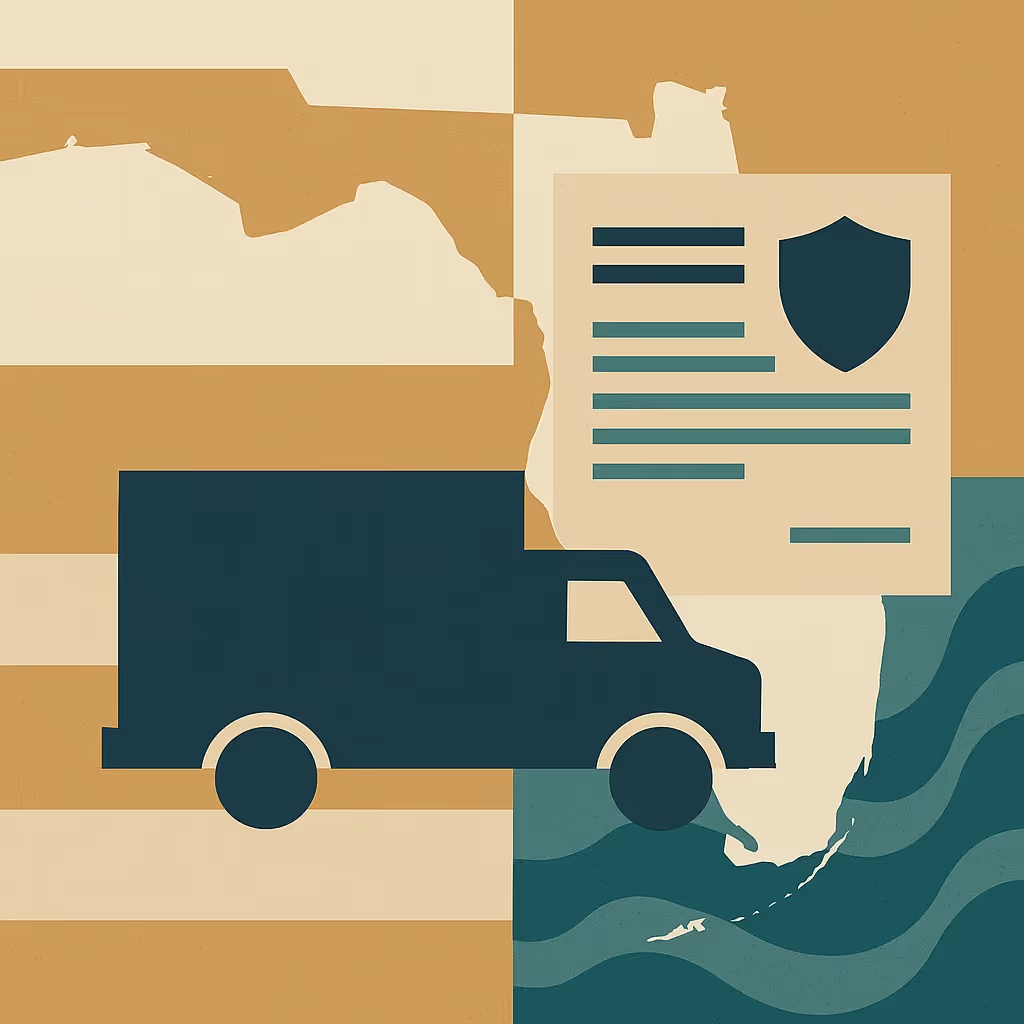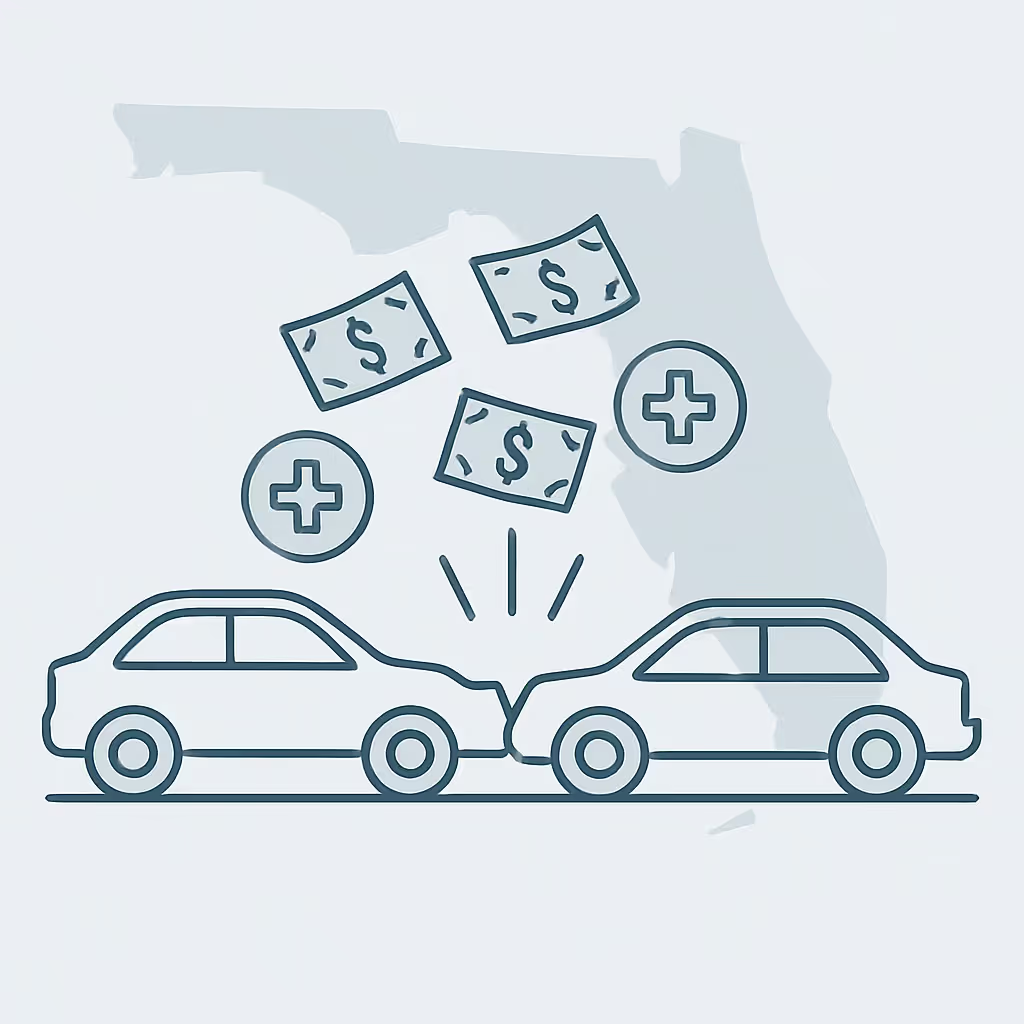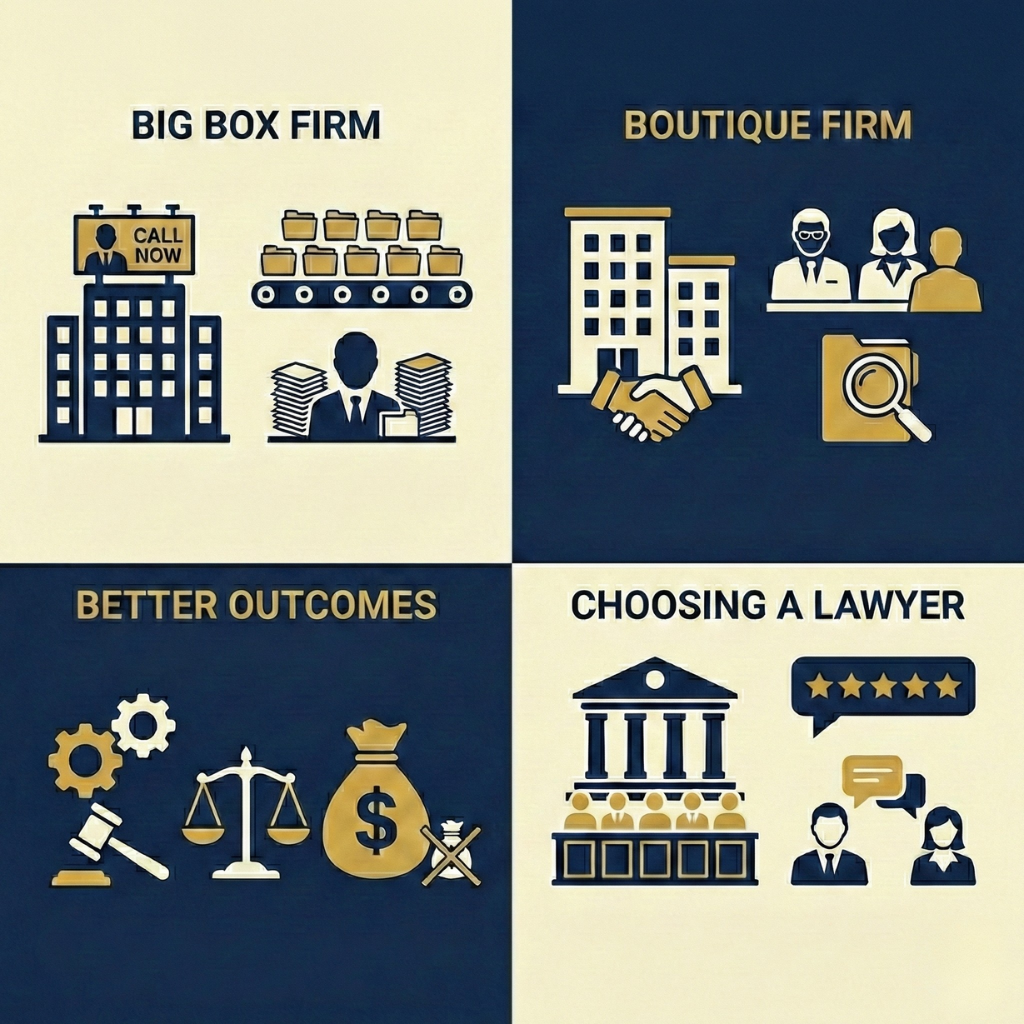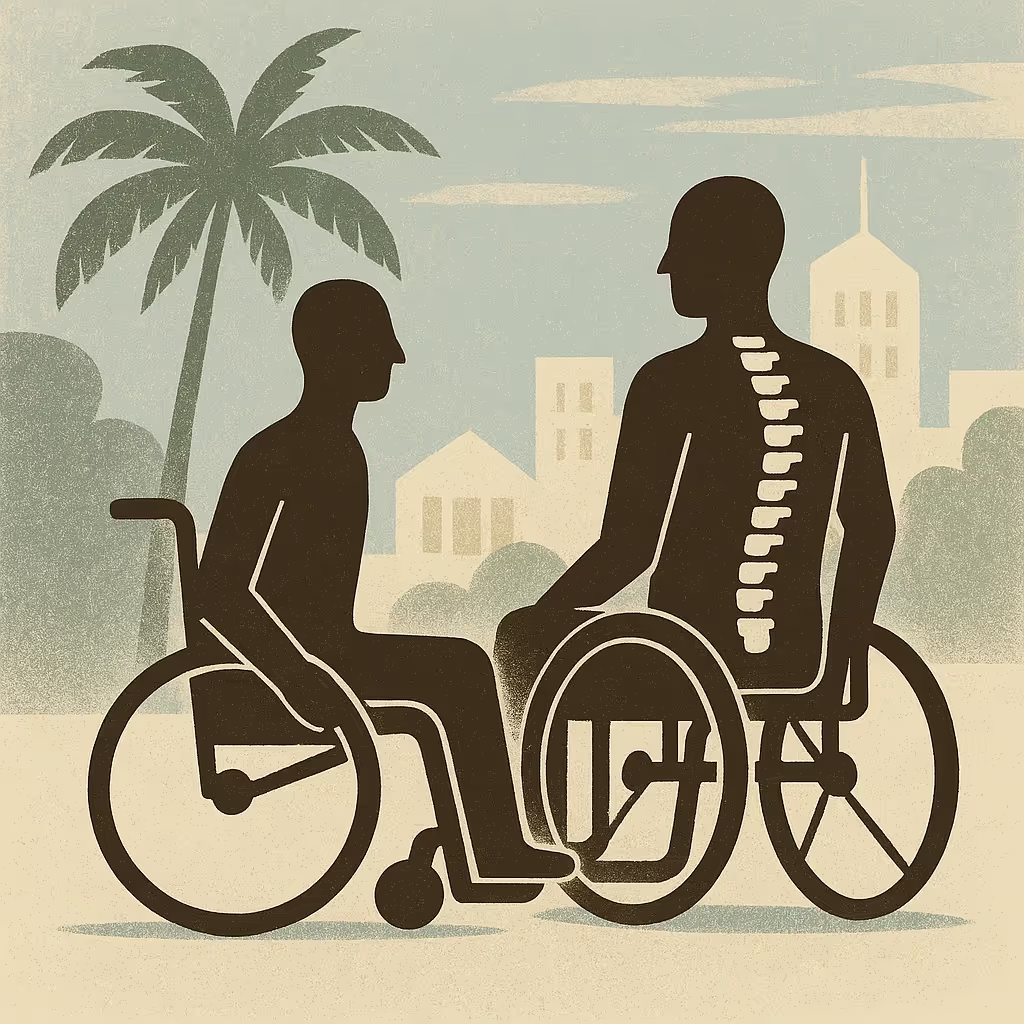Slip and Fall vs Trip and Fall: Know the Difference in Florida Law
Learn the critical legal differences between slip & fall vs trip & fall accidents in Florida. Get expert guidance on premises liability law & your rights.
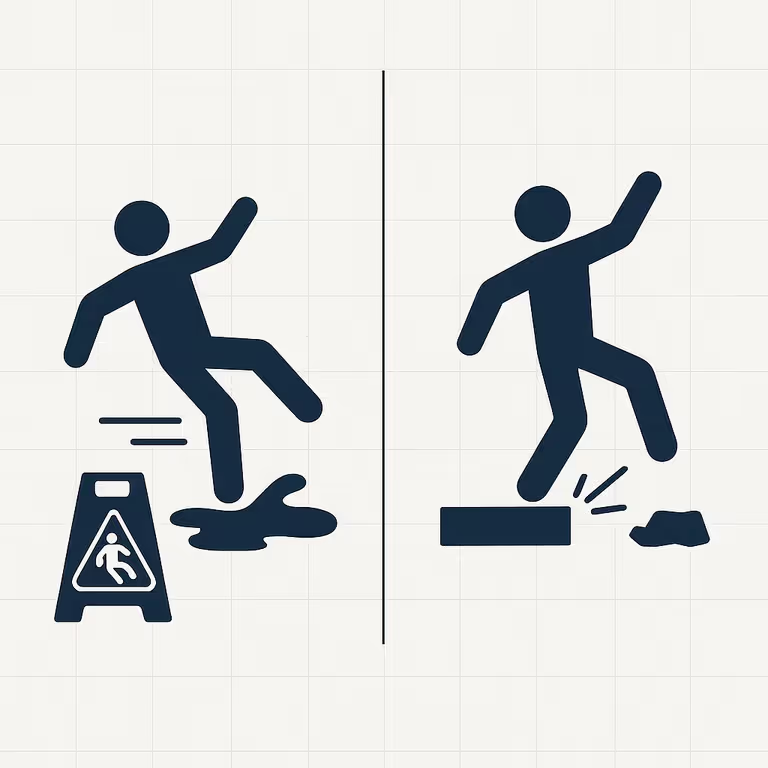
- Slip and fall accidents involve losing traction on surfaces while trip and fall accidents involve striking obstructions or uneven surfaces.
- Florida Statute 768.0755 sets specific requirements for slip and fall cases involving temporary substances like spills.
- Immediate documentation with photos, witness statements, and incident reports provides the foundation for strong premises liability cases.
Worried About Your Injury Case? We'll Review It - Free!


The Difference Between a Trip and a Slip
Picture this: You're walking through a grocery store in Melbourne when suddenly you find yourself on the ground, injured and confused about what just happened. Whether you slipped on a wet floor or tripped over merchandise left in the aisle, understanding the difference between these two types of accidents could be crucial to protecting your legal rights and securing the compensation you deserve.
Slip and fall accidents occur when you lose traction on a surface. This typically happens on wet floors, recently mopped areas, icy walkways, or surfaces made slippery by spilled liquids, food, or cleaning products. The key characteristic is that your foot loses its grip, causing you to slide and fall.
Trip and fall accidents, on the other hand, happen when your foot strikes an obstruction or uneven surface. This could be a raised sidewalk section, debris left in walkways, poor lighting that conceals hazards, loose carpeting, or equipment placed where customers walk. Unlike slip and falls where you lose traction, trip and falls involve your foot hitting something that shouldn't be there or isn't properly maintained.
This distinction matters significantly under Florida law because each type of accident requires different evidence to prove a property owner's negligence. For slip and fall cases involving temporary substances like spilled drinks or dropped food, Florida Statute 768.0755 sets specific requirements about what you must prove. For trip and fall cases involving structural hazards or maintenance issues, different legal standards apply.
At Douglas R. Beam P.A., we've successfully represented clients in both types of premises liability cases throughout Brevard County for over three decades. Our experience includes securing a recent $210K slip and fall settlement, and we understand exactly what evidence is needed to build a strong case regardless of which type of accident caused your injuries.
Whether you slipped on a wet surface at the Melbourne Square mall or tripped on an uneven sidewalk outside a Cocoa Beach restaurant, the property owner may be liable for your injuries if they failed to maintain safe conditions. Florida law recognizes that business customers (called "invitees") deserve the highest level of protection, meaning store owners have a legal duty to regularly inspect their premises and fix dangerous conditions.
The bottom line for Melbourne slip and fall lawyers and the clients we serve: understanding whether your accident was a slip and fall or trip and fall helps determine the best legal strategy for your case.
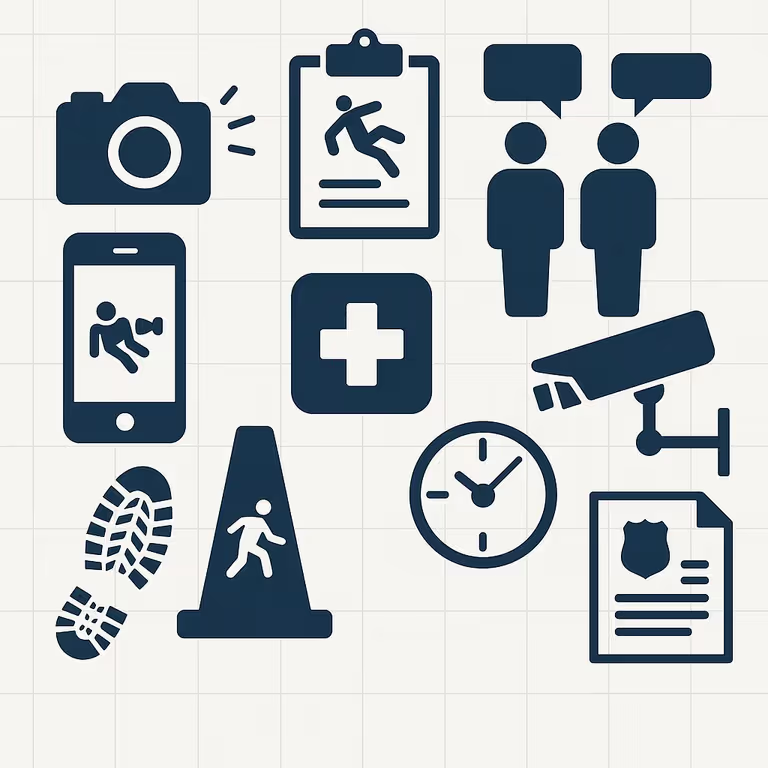
Does This Mean a Lawsuit?
Understanding Florida's premises liability law doesn't require a law degree, but it does require knowing the key concepts that determine whether a property owner can be held responsible for your injuries.
Florida's Premises Liability Framework: Who Owes You What?
Florida law recognizes that different types of visitors to a property deserve different levels of protection. If you're a customer in a store, restaurant, or other business (legally called a "business invitee"), you receive the strongest protection under Florida law. Property owners must actively inspect their premises, identify potential hazards, and either fix dangerous conditions or warn customers about them.
The Knowledge Requirement: Did They Know About the Hazard?
The central question in most slip and fall or trip and fall cases boils down to this: Did the property owner know or should they have known about the dangerous condition that caused your accident?
Actual knowledge means the property owner definitely knew about the hazard. Maybe an employee witnessed a customer spill something, or someone reported a broken tile to management. This is the strongest type of case because proving the owner knew about the danger makes it clear they should have done something about it.
Constructive knowledge means the property owner should have known about the hazard through reasonable inspection, even if nobody specifically told them about it. Florida courts have established that property owners must prove "the condition existed for such a length of time that in the exercise of ordinary care, the [property owner] should have discovered the condition and its dangerous character." This often comes down to how long the hazard existed and whether regular inspections would have found it.
Florida Statute 768.0755: Special Rules for Temporary Substances
When your slip and fall accident involves a temporary substance like spilled liquid, dropped food, or tracked-in mud, Florida Statute 768.0755 applies. This law specifically governs cases involving "transitory foreign substances" in business establishments.
Under this statute, you must prove the business had actual or constructive knowledge of the substance that caused your fall. This means either someone who worked there knew about the spill, or the spill had been there long enough that reasonable inspection procedures should have discovered it.
For example, if you slip on a grape that fell from someone's shopping cart five minutes ago, that's much harder to prove than slipping on a puddle that's been growing under a leaky refrigerator case for hours. The business might successfully argue they couldn't have known about a brand-new spill, but they should definitely have known about a long-standing leak.
Recent Legal Changes: 2023 Tort Reform Impacts
Florida's legal landscape for personal injury cases shifted in 2023 with House Bill 837, which modified comparative negligence rules. These changes can impact premises liability cases where the injured person shares some responsibility for their accident. If you're found partially at fault for your slip and fall or trip and fall (perhaps by texting while walking), your compensation may be reduced based on your percentage of fault.
The key takeaway for Brevard County residents: Recent changes make it even more important to work with experienced Melbourne premises liability attorneys who understand how these new rules affect your case.
Building Strong Cases in Melbourne and Beyond
What sets successful premises liability cases apart is thorough preparation and understanding of how Florida courts apply these legal standards. Property owners often have teams of lawyers and insurance companies working to minimize their liability, so having experienced representation familiar with local courts and opposing counsel can make a significant difference in your case outcome.

What to Do After a Fall
Building a strong slip and fall or trip and fall case starts the moment your accident happens. The evidence you gather and the actions you take in the hours and days following your incident can literally make or break your ability to recover compensation.
Immediate Action Checklist: What to Do at the Scene
Document everything with photos: Take pictures of the exact spot where you fell, including the hazardous condition from multiple angles. If you slipped on a wet floor, photograph the liquid, any nearby leaking equipment, and the absence of warning signs. For trip and fall accidents, capture the uneven surface, debris, or obstruction that caused your fall. Don't forget to photograph your visible injuries and the scene from your eye level as you approached the hazard.
Report the incident immediately: Insist on filing a written incident report with the property owner or manager. Don't let them brush you off with "we'll take care of it." Get a copy of the report or, at minimum, the report number and the name of the person who took the report.
Identify and contact witnesses: Anyone who saw your accident could provide crucial testimony later. Get names, phone numbers, and brief statements about what they witnessed. Even customers who didn't see you fall but noticed the hazardous condition earlier could be valuable witnesses.
Seek medical attention promptly: Getting medical care creates an official record of your injuries and establishes a clear timeline. Even if you feel "okay" initially, adrenaline and shock can mask serious injuries.
Different Evidence for Different Accident Types
Slip and fall cases often hinge on timing evidence. How long was that spill on the floor? When was the area last inspected or cleaned? Request surveillance footage immediately, as many businesses only keep recordings for 30-60 days. Look for evidence of the business's cleaning schedules, inspection logs, and employee training records about spill management.
Trip and fall cases typically focus on maintenance and structural issues. Document the property's condition thoroughly - was there adequate lighting? Were walkways properly maintained? Had other people complained about or noticed the same hazard? Property maintenance records, previous incident reports, and building code compliance documents often prove crucial.
Florida's Statute of Limitations: Time Limits Matter
Most premises liability cases in Florida must be filed within two years of the accident date, though some specific circumstances may have shorter deadlines. This might seem like plenty of time, but evidence disappears quickly. Surveillance footage gets deleted, employees leave their jobs, and witnesses' memories fade.
The Property Owner's Response: What It Means for Your Case
Pay attention to how the property owner responds after your accident. Do they immediately fix the hazardous condition? Do they change their inspection procedures? Do they try to contact you with quick settlement offers? These actions can provide insight into whether they knew they had a dangerous condition.
Be extremely cautious about accepting quick settlement offers before you know the full extent of your injuries. Some injuries, particularly back and neck problems, may not manifest symptoms for days or weeks after your accident.
Building Cases That Win
Recent Florida appellate decisions emphasize that courts want concrete evidence, not speculation. You can't win a case by simply arguing "they should have known" without backing it up with specific facts about timing, inspection procedures, and reasonable care standards.
Our experience with premises liability cases throughout Brevard County has shown that thorough documentation from day one significantly strengthens case outcomes. Property owners and their insurance companies take cases much more seriously when they see that injured people have carefully preserved evidence and understand their rights under Florida law.
Understanding Surveillance Evidence
Most businesses today have security cameras, and this footage often provides the clearest picture of your accident. However, you'll need to act quickly to preserve this evidence. Send a written request (preferably through an attorney) demanding that the business preserve all surveillance footage from the day of your accident. Without this formal demand, businesses may accidentally or intentionally delete crucial evidence.

How to Get the Best Help Possible
Dealing with insurance companies after a slip and fall or trip and fall accident can feel overwhelming, especially when you're focused on recovering from your injuries. Understanding the process and knowing when you need professional legal help can make the difference between receiving fair compensation and being taken advantage of by experienced insurance adjusters.
Common Insurance Company Tactics: What to Expect
Insurance adjusters are trained professionals whose job is to minimize their company's financial exposure. They're not your friends, even when they seem sympathetic and helpful. Expect tactics like:
Quick, low settlement offers before you know the full extent of your injuries. They're hoping you'll accept a small amount rather than pursue fair compensation for ongoing medical treatment, lost wages, and pain and suffering.
Requesting recorded statements where they ask leading questions designed to get you to say something that undermines your case. Remember, you're not legally required to give recorded statements to the other party's insurance company.
Claiming you were partially or entirely at fault for your accident, even when clear evidence shows property owner negligence caused your fall.
Requesting excessive documentation to delay your case and pressure you into accepting less money.
Critical Mistakes That Can Damage Your Case
Don't discuss fault or apologize at the scene or in conversations with insurance representatives. Saying "I'm sorry" or "I should have been watching where I was going" can be used against you later, even if you were just being polite.
Never sign any documents without having them reviewed by an attorney. Insurance companies often try to get injured people to sign releases that limit their ability to pursue full compensation.
Don't delay medical treatment to save money. Gaps in your medical treatment give insurance companies ammunition to argue your injuries weren't serious or weren't caused by the accident.
When to Contact an Attorney: Critical Decision Points
While not every slip and fall or trip and fall requires legal representation, certain circumstances strongly indicate you need professional help:
Complex or serious injuries that require ongoing medical treatment, surgery, or result in permanent disability deserve the attention of experienced legal counsel.
Disputed liability cases where the property owner claims you were at fault or that no hazardous condition existed need skilled legal advocacy.
Significant medical bills that exceed several thousand dollars warrant professional case evaluation to ensure you're not leaving money on the table.
Property owner denial of responsibility requires legal expertise to gather evidence and build a compelling case under Florida law.
What to Expect from Professional Legal Consultation
A thorough legal consultation should include a complete case evaluation, timeline discussion, and clear explanation of fee structure. Most personal injury attorneys, including our firm, work on contingency fees - you don't pay attorney's fees unless we win your case.
During your consultation, expect discussions about the strength of your evidence, potential compensation ranges, likely case timeline, and specific challenges your case might face. Honest attorneys will tell you if your case has problems or if the potential recovery doesn't justify the costs of pursuing legal action.
The Value of Local Representation in Brevard County
Knowledge of local courts, judges, and opposing counsel in Brevard County can make a significant difference in case outcomes. Local attorneys understand which insurance companies tend to settle fairly and which ones require aggressive litigation. We know which local experts provide the most compelling testimony and how to navigate the specific procedures of Brevard County courts.
View our $210K slip and fall settlement to see how experienced representation can make a difference in securing fair compensation for our clients.
Understanding Compensation: What Your Case Might Be Worth
Slip and fall and trip and fall compensation typically covers medical expenses, lost wages, future medical treatment, and pain and suffering. The value depends on injury severity, medical costs, impact on your daily life, and lost earning capacity.
Florida's 2023 tort reform changes mean that if you're found partially at fault for your accident, your compensation will be reduced by your percentage of fault. This makes it even more important to have skilled representation that can minimize any claimed comparative negligence.
Contact our Melbourne office to schedule a free consultation about your slip and fall or trip and fall case. We'll review your situation and explain your legal options with no obligation on your part.

Understanding your rights after a slip and fall or trip and fall accident in Florida means having clear answers to the questions most injured people ask. Here are the essential answers you need to make informed decisions about your case.
Frequently Asked Questions About Slip and Fall vs Trip and Fall Cases
How do I know if I have a valid slip and fall or trip and fall case in Florida?
A valid premises liability case requires four key elements: you were legally allowed on the property (such as being a customer), a hazardous condition existed, the property owner knew or should have known about the hazard, and the hazardous condition directly caused your injuries. The strength of your case depends on factors like injury severity, clear evidence of property owner negligence, documented hazardous conditions, and available witness testimony. Whether you slipped on a wet floor or tripped over an obstruction, the core issue is whether reasonable property maintenance and inspection would have prevented your accident.
What's the difference in compensation between slip and fall vs trip and fall cases?
Compensation depends on your injuries and their impact on your life, not the specific type of accident. Both slip and fall and trip and fall cases can result in similar injuries and similar compensation ranges. What matters is documenting your medical expenses, lost wages, future treatment needs, and pain and suffering. Serious injuries that require surgery, result in permanent limitations, or prevent you from working deserve substantial compensation regardless of whether you slipped or tripped.
How long do I have to file a lawsuit for my accident in Florida?
Florida's statute of limitations for most premises liability cases is two years from the accident date, though some specific circumstances may have shorter timeframes. However, waiting too long can hurt your case even if you're within the legal deadline. Evidence disappears, witnesses move away, and surveillance footage gets deleted. The sooner you take action, the better your chances of preserving crucial evidence.
Can I still recover money if I was partially at fault for my accident?
Florida's modified comparative negligence law allows you to recover compensation even if you share some fault for your accident, as long as your fault is less than the property owner's fault. However, your compensation will be reduced by your percentage of responsibility. For example, if you're found 20% at fault for texting while walking, your compensation would be reduced by 20%. Recent 2023 changes to Florida law have made these fault determinations more significant, emphasizing the importance of skilled legal representation to minimize any claimed comparative negligence.
Please remember, this article provides general information based on Florida law and is intended for educational purposes only. It does not constitute legal advice and should not be relied upon as such. Every case is unique, and the information here may not apply to your specific circumstances. Reading this article does not create an attorney-client relationship. For advice tailored to your situation, please consult with a qualified attorney.
Not Sure What To Do Next? We Can Help – Fast & Free.
Worried About Your Injury Case?
We'll Review It - Free
Don’t miss an article
Florida law, local insights, and the occasional dog pic.
Delivered straight to your inbox.
More articles
Browse all articlesFree Case Review
Get a complimentary review of your case

.webp)
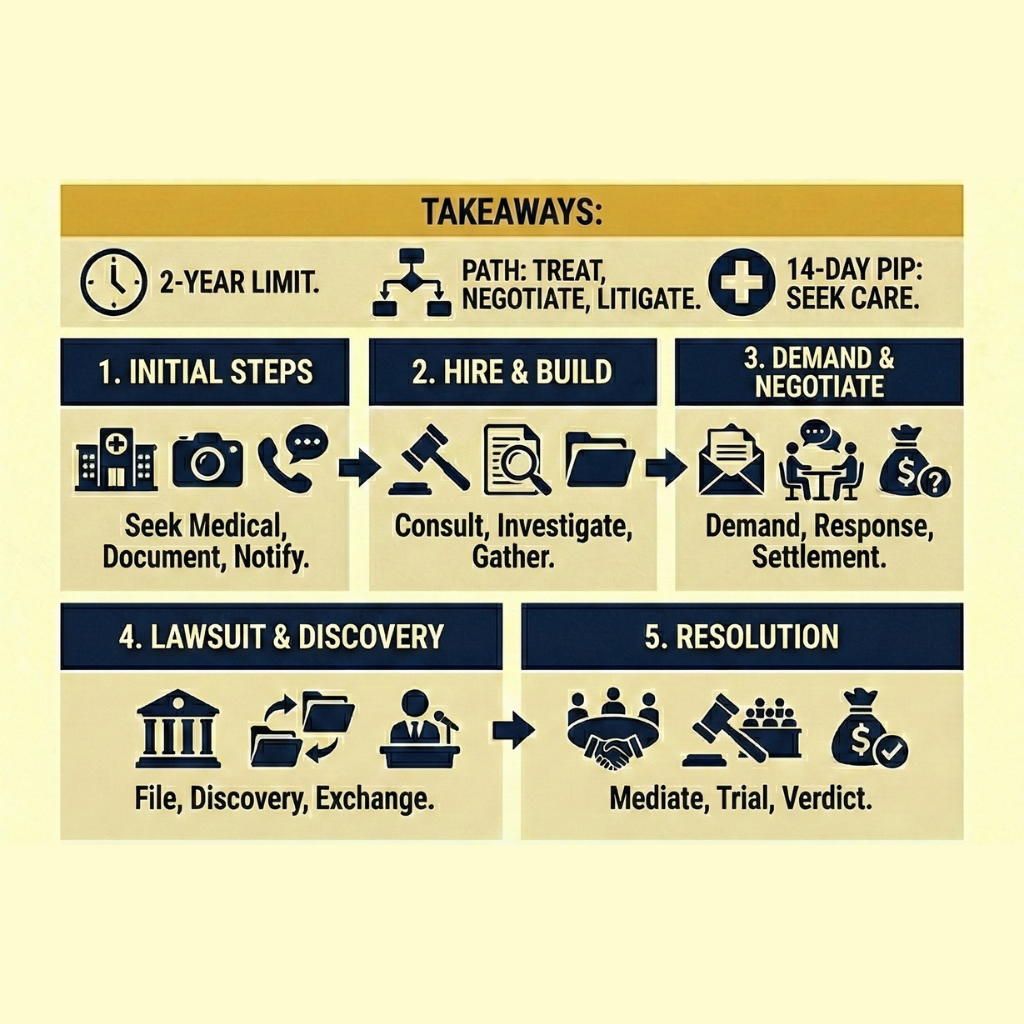


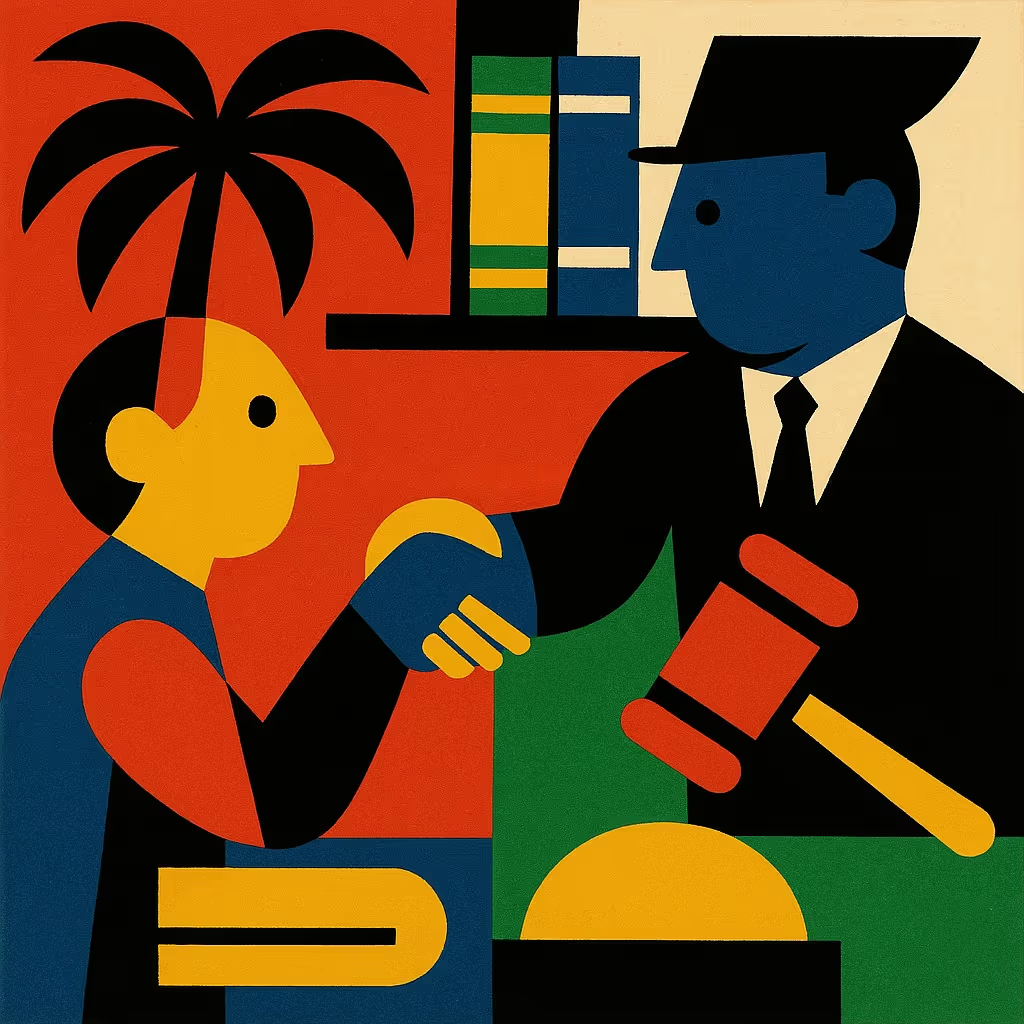
.png)
